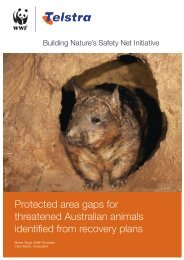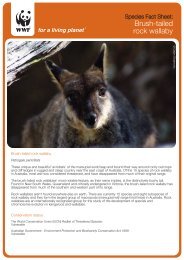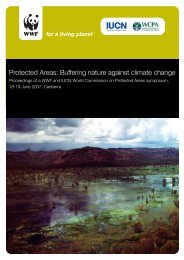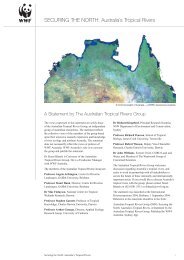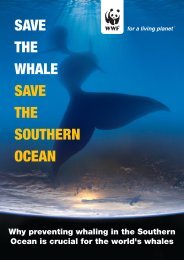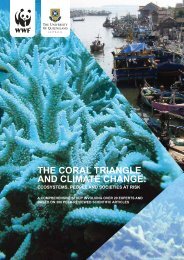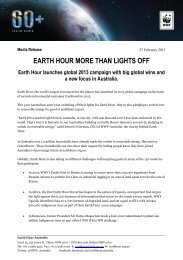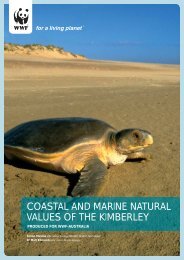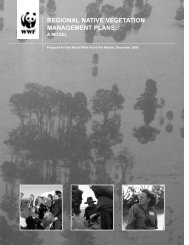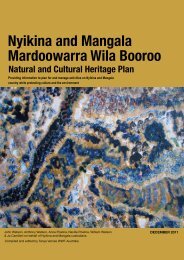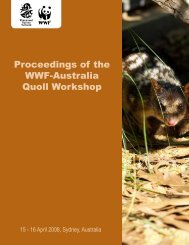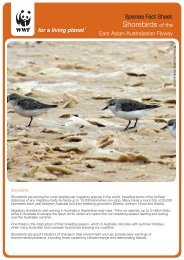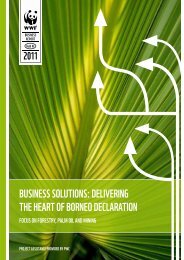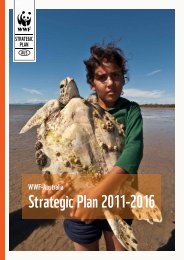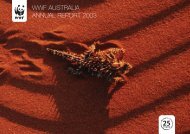Indigenous Peoples and Conservation Organizations
Indigenous Peoples and Conservation Organizations
Indigenous Peoples and Conservation Organizations
You also want an ePaper? Increase the reach of your titles
YUMPU automatically turns print PDFs into web optimized ePapers that Google loves.
100 The Foi in Papua New Guinea<br />
Soon after contact, however, fundamentalist<br />
Christian mission stations were established in Foi<br />
territory <strong>and</strong> protected by the state. As the state<br />
usurped tribal autonomy, the missions became<br />
agents of pacification. They were a major force in<br />
undermining the traditional way of life, <strong>and</strong> ceremonial<br />
dances, rituals, art, clothing, <strong>and</strong> body decoration<br />
began to disappear. This snapped the<br />
threads of connection between culture <strong>and</strong> nature,<br />
<strong>and</strong> would have far-reaching consequences. As<br />
prohibitions against violating the dominion of<br />
masalai <strong>and</strong> ancestral spirits waned, the forestedge<br />
communities began to think of offers by commercial<br />
loggers as an easy road to development.<br />
Finally significant economic development arrived<br />
in the form of the Kutubu Oil Project, operated<br />
by Chevron Niugini. This project, which spent<br />
nearly $1.5 billion (in 1992 dollars) on exploration<br />
<strong>and</strong> project construction, was the single<br />
biggest resource sector investment in the history<br />
of PNG. The sparse population within the<br />
Petroleum Development License area comprised<br />
only about 134 Fasu <strong>and</strong> Foi clans, each of which<br />
averaged about 10 to 15 members in size. A road<br />
was built at enormous cost to service the project,<br />
<strong>and</strong> ended in the blink of an eye the long geographical<br />
isolation of the Foi <strong>and</strong> Fasu from the<br />
outside world. Project development <strong>and</strong> construction<br />
were carried out between December<br />
1990 <strong>and</strong> September 1992.<br />
The benefit streams that have flowed to the<br />
affected l<strong>and</strong>owner communities since then are<br />
worth tens of million of dollars. By 1995, the<br />
total benefits from royalty, compensation, <strong>and</strong><br />
l<strong>and</strong> use payments, a Special Support Grant, tax<br />
credit schemes, <strong>and</strong> direct <strong>and</strong> indirect services<br />
from developers amounted to over K69.6 million. 3<br />
This does not include the K70 million in contracts<br />
negotiated with L<strong>and</strong>owner Companies <strong>and</strong> the<br />
projected equity payment of K62.85 million. The<br />
Kutubu Access Road <strong>and</strong> the Moro airstrip<br />
together cost about K91 million.<br />
The impact of these benefits, however, has not<br />
been equal. By 1995, beneficiaries numbered<br />
about 427 clans <strong>and</strong> 13,750 people living in 84<br />
villages in Southern Highl<strong>and</strong>s <strong>and</strong> Gulf<br />
provinces. The Fasu, who numbered only about<br />
1,500 people <strong>and</strong> 58 clans, were the largest beneficiaries.<br />
The Foi consisted of 169 clans <strong>and</strong><br />
7,000 people, but reaped a much smaller portion<br />
of income flows. The remaining 5,250 people,<br />
distributed in 200 clans, live in Gulf Province.<br />
The Foi <strong>and</strong> Fasu, who traditionally enjoyed very<br />
strong social <strong>and</strong> cultural ties <strong>and</strong> shared similar<br />
subsistence lifestyles, were quickly divided by<br />
the huge economic chasm created by the unequal<br />
benefit streams from the petroleum project. The<br />
Foi benefit pie is about one-tenth the size of the<br />
Fasu pie, <strong>and</strong> must be shared among nearly five<br />
times as many people. This inequality has<br />
imposed serious social strains on the Foi <strong>and</strong><br />
ironically threatens to be a curse rather than a<br />
blessing for the Fasu. WWF does little or no<br />
work among the Fasu people since their “petroaffluence”<br />
has minimized the common ground<br />
needed to evolve a meaningful partnership. The<br />
Foi have watched their Fasu neighbors drown in<br />
wealth as a flood of consumption has led to<br />
social <strong>and</strong> cultural degradation. The Foi believe,<br />
with reason, that the Fasu cannot sustain their<br />
present course without irremediable damage.<br />
The Foi have also seen the impact on their own<br />
way of life. Stanley Wabi, for instance, is a community<br />
outreach worker in WWF’s local program.<br />
His first experience with money came in<br />
1980, when he was paid K6 for carrying the<br />
patrol box of a soldier. Wabi had no place to<br />
spend the money, nothing to spend it on. He<br />
depended entirely on game meat <strong>and</strong> garden<br />
food. Throughout the 1980s, unskilled labor<br />
could earn one about K10 a fortnight. But with<br />
the arrival of the oil project, opportunities for<br />
wage labor increased <strong>and</strong> pay rose to K200 or<br />
K300 per fortnight. The cash flowing from work<br />
with the oil project <strong>and</strong> its contractors <strong>and</strong> from<br />
royalty <strong>and</strong> compensation payments has created a<br />
miniconsumer economy. Reliance on subsistence<br />
foods is waning, <strong>and</strong> consumption of soft drinks,<br />
rice, sugar, <strong>and</strong> canned meat are on the rise.<br />
Subsistence production is increasingly thought of<br />
as hard, time-consuming work. Knowledge of<br />
plants <strong>and</strong> the natural world is in danger of being<br />
lost. Traditional authority <strong>and</strong> leadership is<br />
being challenged, <strong>and</strong> the young, drawn to<br />
Western ways, are becoming alienated from their<br />
own heritage. Today, Wabi is 34, <strong>and</strong> he <strong>and</strong> others<br />
of his generation see things slipping away.<br />
He <strong>and</strong> others say that their way of life can last<br />
forever but only as long as they look after their<br />
resources <strong>and</strong> use them wisely. Spared from the<br />
overwhelming temptation the Fasu face, the Foi



